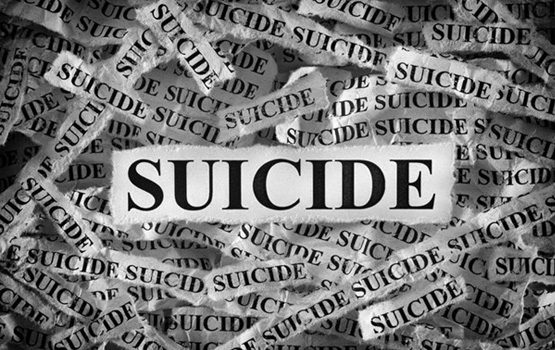
Suicide rate soars, as stigma, lack of support worsen mental health crisis
..Send help, not punishment – Advocates urge mental health support for victims
…Suicide criminalisation impedes communal healing — Shindara Ibiyemi
By Sodiq Adelakun
Suicide rates in Nigeria have reached alarming levels, with a rising number of law enforcement officers, individuals particularly among the youth, taking their own lives due to overwhelming personal, economic, and social pressures
Despite the growing urgency, a lack of adequate mental health resources and the criminalisation of suicide attempts continue to hinder efforts to address the crisis.
Speaking with our correspondent, Mr. Ayo Fatunde, a middle-aged man from Sango, Ogun State, shared his experience of attempting suicide for the third time.
With a cracking voice, he recounted the events that led him to the despair, saying, “I almost took my life last Friday, when I could not feed my family again, and this is because I did not go to work since the beginning of the year, my wife left, and took my children away, I began to drink irresponsibly. I thought within me that was the only option left for me.”
In another similar yet tragic event, on Saturday morning in Yenagoa, Bayelsa State, when tragedy struck the Kpansia suburb.
Ayibanua Timipre, a promising 16-year-old boy on the brink of celebrating his birthday, was found lifeless, hanging from a ceiling fan in his family home.
Friends and neighbours, who described him as a well-liked, calm youth engaged in mobile mechanic training, were jolted by the tragic news. What could have led this teenager, who had so much to look forward to, to take his own life just hours before he turned 17?
Data reveals that suicide has become alarmingly prevalent among Nigeria’s youth, with the Nigeria Suicide Advocacy Group emphasising that it is the second leading cause of death for young people.
Recall that a 2024 report from the World Health Organisation indicates that Nigeria is among the countries with the highest rates of suicide in the world, particularly affecting low- and middle-income groups.
The enormity of the problem is compounded by the prevailing stigma that surrounds mental health, leaving many to suffer in silence..
Just weeks earlier, reports emerged of a police constable in Nasarawa, Dogara Akolo-Moses, and an Assistant Superintendent in Niger State, Shafi’u Bawa, both taking their lives under similarly mysterious circumstances.
Their deaths brewed investigations, but the reasons remain obscured, hinting at underlying problems within the pressures faced by law enforcement personnel in a country grappling with systemic stressors.
Nigerian students face relentless pressure to perform academically. In an education system where success is seen as the only path to a better life, many young people are burdened by unrealistic expectations.
University students, particularly in their final years, often feel isolated, with mounting pressure to meet the demands of family and society. The fear of failure and the inability to secure employment after graduation add to the weight of their mental and emotional struggles.
In a country where the unemployment rate continues to rise, students see little hope for their future, adding to the despair that sometimes leads to drastic decisions.
Law enforcement officers, like police officers, are often overlooked in discussions about mental health. The stress of dealing with crime, public unrest, low pay, and insufficient resources creates a toxic environment for police officers. In 2025 only, Nigeria witnessed a rise in suicides among police officers. Many officers are overwhelmed by the dangers they face daily, often without proper psychological support.
The systemic issues within the Nigerian police force, including long hours, low wages, and lack of mental health resources, have contributed to a troubling increase in suicides.
Nigerian society places a heavy emphasis on success, especially in the face of adversity. Family, cultural, and societal pressures create an environment where failure is seen as shameful, and mental health struggles are often dismissed or ignored.
A consultant psychiatrist and member of the Nigeria Suicide Advocacy Group, Prof. Taiwo Sheikh has been vocal about the necessity of decriminalising suicide.
The Nigerian legal framework, still rooted in colonial era laws, treats attempted suicide as a misdemeanor, giving rise to punitive measures that further alienate those in crisis.
As Prof. Sheikh points out, “The major barrier to suicide prevention is the law that criminalises attempted suicide.” This legal stance not only drives the issue underground but also complicates access to mental health resources.
A similar sentiment is echoed by Senior Advocate of Nigeria, Mohammed Mohammed, who emphasised that punitive measures serve only to exacerbate the stigma around mental health issues.
“What people attempting suicide need is help, not punishment,” he stated, urging for collective advocacy and education to shift public perception.
Mental health advocate, Shindara Ibiyemi, Founder of ‘Our Minds, Our Community,’ an organisation that focuses on outreaches for minors added that “even among children, due to what they hear from parents and society, they say things like ‘i will tell the person to commit suicide because he is useless’.”
“That was the shocking statement made at the just concluded outreach in January 2025. Hearing that reaffirmed what I do as a mental health advocate. Criminalisation of suicide is a big blow, and impedes the work we do in communities.”
Also, in Makurdi, tragic circumstances led another man, Tartor Ayihe, to take his life after revelations that he had sold a plot of land to three different buyers.
The insurmountable pressure to confront community leaders over the deception became unbearable, leading him to consume a poisonous substance.
Across the ocean, in the United States, Dr. Ikenna Erinne, a Nigerian cardiologist, exhibited a different dimension of despair.
After engaging in a highly publicised custody battle, he held his estranged partner and their children at gunpoint, culminating in his suicide when confronted by police.
His father-in-law’s allegations highlight how financial strain and personal crisis can lead to drastic outcomes. The multifaceted nature of suicide is evident, influencing families both at home and abroad.
Meanwhile, the causes of suicide are complex and multifactorial, ranging from economic struggles, legal pressures, and social isolation to unaddressed mental health issues.
A viral report in January explained how economic factors and the absence of supportive anti-suicide laws were amplifying the risk.
In the came vein, the Nigeria Suicide Advocacy Group is pushing for essential legislative changes, while professionals and activists work to spread awareness about mental health issues across society.
Educators, parents, and community leaders are being urged to open dialogues about mental health, fostering environments where individuals feel safe to express their struggles.




